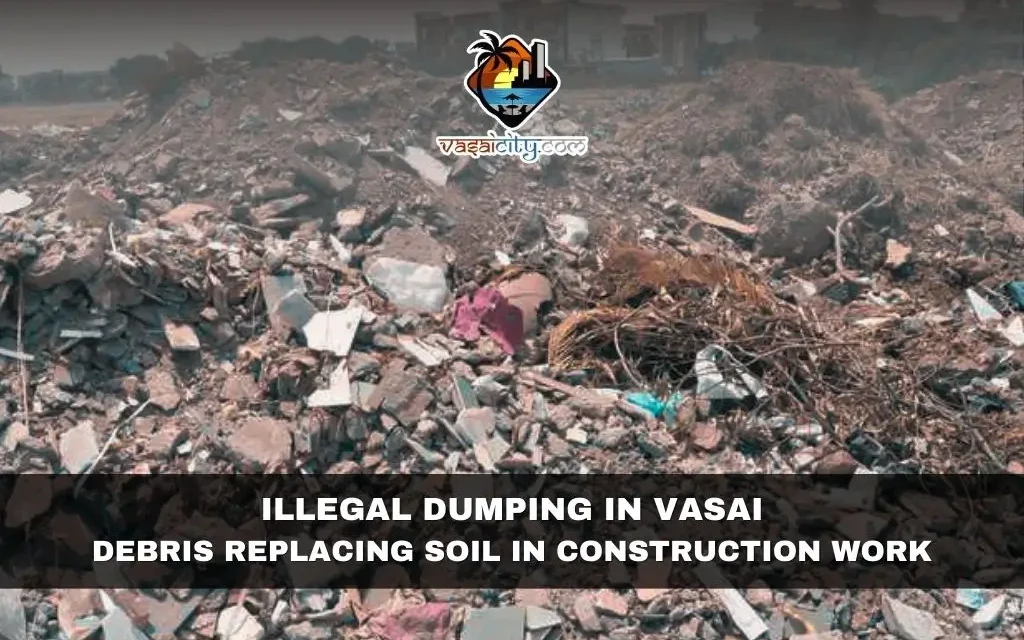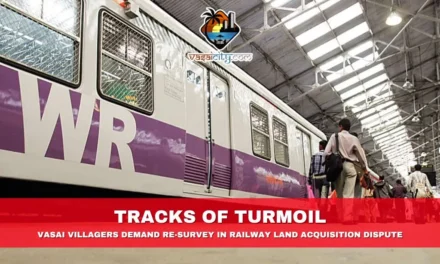In the rapidly developing Vasai-Virar region near Mumbai, an alarming issue is unfolding in the construction sector. Instead of using licensed soil for landfilling and leveling, as per the regulations, a new trend of dumping construction debris is taking over. This illegal practice not only bypasses the required revenue permits but also brings several environmental and financial concerns to the forefront.
The Vasai-Virar area has experienced rapid growth in recent years, with construction projects booming across the region. These projects require large amounts of soil to fill and level the land before any building activity can take place. Typically, the revenue department issues licenses to those transporting and using soil for such purposes, collecting royalties that contribute to the government’s revenue. However, it has been noticed that instead of the required soil, debris, known as “rada-roda,” is being used at various construction sites.
A Growing Problem
In many parts of Vasai-Virar, construction debris is mixed with soil and used for landfills, even though it doesn’t meet the necessary standards. Unsuspecting individuals might assume that this mix is regular soil. This practice not only evades revenue permits but also results in substantial financial losses for the government. Since the debris used is not categorized under “minor minerals,” the revenue department faces difficulties in taking action against such activities. This loophole has allowed land mafias to carry out their illegal activities unchecked.
These mafias have sidestepped the requirement for soil licenses, filling land with a dangerous mix of debris and soil. It’s a profitable scheme for them but comes at a great cost to the environment and public safety. The authorities have received numerous complaints from residents, but their hands are tied due to the lack of legal provisions to act against debris dumping.
Environmental Consequences
One of the major consequences of using debris instead of soil is its impact on the natural environment. Much of the illegal dumping is taking place near special highways, on government lands, and in ecologically sensitive areas such as wetlands and mangroves. These natural spaces are crucial for the balance of the ecosystem, but they are being filled up with rubble and debris. The debris blocks natural water flow, which can exacerbate flooding during the monsoon season. In urban areas like Mumbai and Vasai-Virar, where monsoon flooding is already a concern, such activities pose a serious risk.
In addition, the unregulated dumping of debris has started to affect private agricultural lands as well. Under the cover of night, trucks filled with debris make their way to these lands and dump the rubble without the consent of the landowners. When authorities investigate, the burden often falls on the landowners, who must explain why debris has been dumped on their property. This has led to conflicts and legal challenges, with many farmers facing fines and penalties even though they are the victims in this situation.
Financial Losses for the Government
The financial implications of this illegal dumping are significant. When legitimate soil is used for landfills, the revenue department collects royalties based on the volume of soil transported. However, with the rise of debris dumping, the government is losing out on a substantial amount of money. The illegal practice not only undermines the legal process but also takes away a major source of revenue. This is particularly concerning in areas like Vasai-Virar, where infrastructure development is at its peak, and proper regulation is essential to ensure that the city can manage its rapid expansion sustainably.
Lack of Legal Framework
One of the key reasons this illegal activity continues unchecked is the lack of a legal framework governing the use of debris in construction. Currently, debris does not fall under the category of “minor minerals,” making it difficult for the revenue department to take action against those using it for landfills. Despite numerous complaints from residents and local officials, the absence of clear regulations means that the authorities can do little to stop the land mafias from exploiting this loophole.
Impact on the Local Population
The illegal dumping of debris is not just an environmental or financial issue; it also has a direct impact on the people living in the region. Local residents have raised concerns about the long-term effects of this practice on the community. In particular, there is a growing fear that the blocked water channels and damaged natural landscapes could lead to more severe flooding in the coming years. The situation is especially concerning in the context of climate change, which has already made rainfall patterns more unpredictable and increased the frequency of extreme weather events.
Additionally, the illegal dumping of debris on agricultural lands has created tensions between landowners and the authorities. Farmers who rely on their land for their livelihood are finding it increasingly difficult to maintain their crops in areas where debris has been dumped. This has led to a decline in agricultural productivity and has put additional pressure on farmers, who are already struggling to cope with the challenges of modern farming.
Calls for Action
The growing problem of illegal debris dumping in Vasai-Virar has prompted calls for action from various quarters. Local residents, environmental groups, and even some government officials have urged the authorities to introduce stricter regulations and penalties for those involved in this illegal activity. There have been suggestions to include debris under the category of “minor minerals,” which would give the revenue department the legal backing to crack down on landfills using debris without a license.
In fact, a few years ago, the Tehsildar’s office in Vasai had sent a letter to the Collector’s office, requesting guidance on how to address this issue. However, little progress has been made since then. Many citizens are now demanding a comprehensive policy to tackle the problem of illegal dumping, protect natural resources, and prevent further environmental damage.
Illegal debris dumping in place of soil in Vasai-Virar has become a pressing issue. It is causing significant financial losses to the government, harming the environment, and affecting the livelihoods of local farmers. Unless a proper legal framework is introduced and stricter enforcement measures are put in place, this issue is likely to worsen, posing serious risks to the community and the region’s natural resources.









